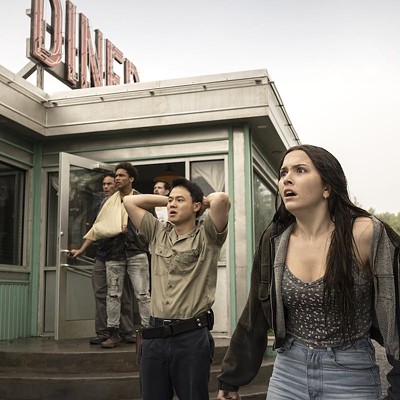It shouldn't matter that Swing Vote isn't plausible. From a human standpoint, it's a great idea for a movie. But its improbability leaves an unresolved weakness: The film has no idea how to make its setup feel credible.
One must accept that Ernest "Bud" Johnson (Kevin Costner) is a not-too-bright, small town factory worker with an annoying know-it-all movie daughter (Madeline Carroll). Since Bud is passed out and can't vote in the presidential election like he promised, his 12-year-old votes for him while the guard is sleeping. The electronic voting machine malfunctions and can't read the vote placed in her father's name. The election's so tight that one vote is all it takes. With the world's attention on him, Bud has to decide the next US president. I know, it's the stupidest thing you've ever heard.
But after the lame excuses, Bud's dilemma has its own life. Democratic and Republican parties, headed by Dennis Hopper and Kelsey Grammer, shift their campaigns to target one individual. This isn't cynical, like campaign satires Bulworth and Wag the Dog: Bud has the pressure of the nation on him to make an informed choice.
Director Joshua Michael Stern manages to make a non-agenda-driven political film without making it apathetic. But it doesn't illustrate Bud's transformation from apathy to his realization (the movie's message) that it's important to become politically aware. His dismissal of the voting process at the beginning of the movie isn't exactly discredited just by throwing in shots of waving flags, and lines about one's duty to vote.
When Bud gives a televised speech stating that his country owes him more, he speaks the movie's true patriotism. It's a brave, unexpected move after the simple-minded political dramas and documentaries of the last few years. For all its shortcuts, Swing Vote has an understanding of present American life.














